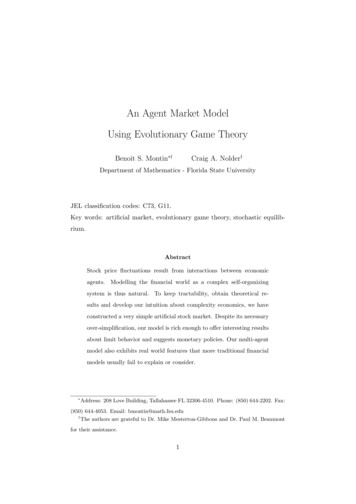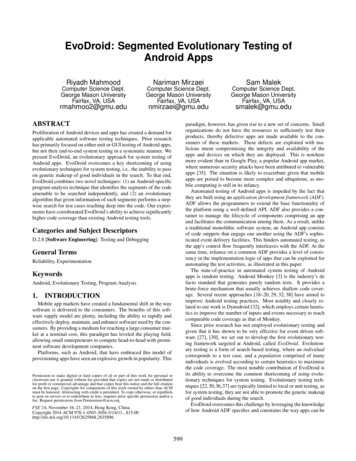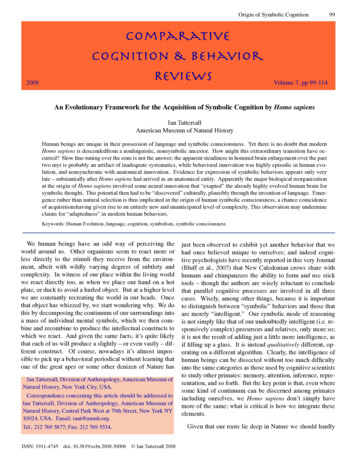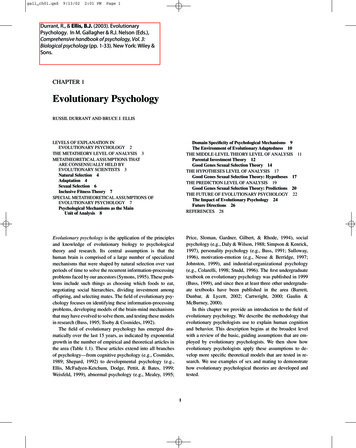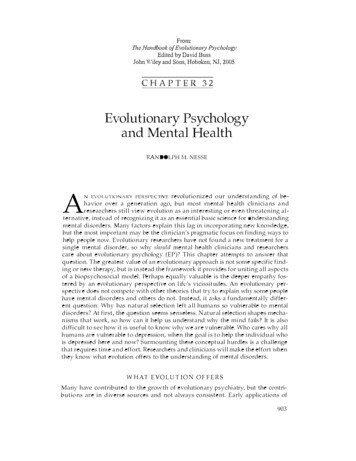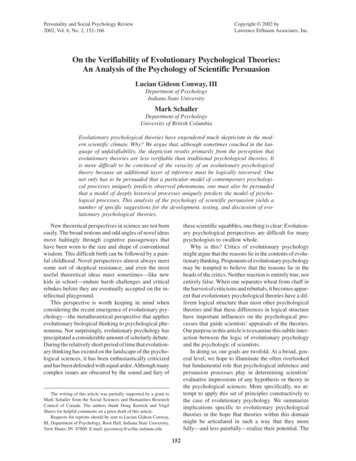
Transcription
Personality and Social Psychology Review2002, Vol. 6, No. 2, 152–166Copyright 2002 byLawrence Erlbaum Associates, Inc.On the Verifiability of Evolutionary Psychological Theories:An Analysis of the Psychology of Scientific PersuasionLucian Gideon Conway, IIIDepartment of PsychologyIndiana State UniversityMark SchallerDepartment of PsychologyUniversity of British ColumbiaEvolutionary psychological theories have engendered much skepticism in the modern scientific climate. Why? We argue that, although sometimes couched in the language of unfalsifiability, the skepticism results primarily from the perception thatevolutionary theories are less verifiable than traditional psychological theories. Itis more difficult to be convinced of the veracity of an evolutionary psychologicaltheory because an additional layer of inference must be logically traversed: Onenot only has to be persuaded that a particular model of contemporary psychological processes uniquely predicts observed phenomena, one must also be persuadedthat a model of deeply historical processes uniquely predicts the model of psychological processes. This analysis of the psychology of scientific persuasion yields anumber of specific suggestions for the development, testing, and discussion of evolutionary psychological theories.New theoretical perspectives in science are not borneasily. The broad notions and odd angles of novel ideasmove haltingly through cognitive passageways thathave been worn to the size and shape of conventionalwisdom. This difficult birth can be followed by a painful childhood. Novel perspectives almost always meetsome sort of skeptical resistance, and even the mostuseful theoretical ideas must sometimes—like newkids in school—endure harsh challenges and criticalrebukes before they are eventually accepted on the intellectual playground.This perspective is worth keeping in mind whenconsidering the recent emergence of evolutionary psychology—the metatheoretical perspective that appliesevolutionary biological thinking to psychological phenomena. Not surprisingly, evolutionary psychology hasprecipitated a considerable amount of scholarly debate.During the relatively short period of time that evolutionary thinking has existed on the landscape of the psychological sciences, it has been enthusiastically criticizedand has been defended with equal ardor. Although manycomplex issues are obscured by the sound and fury ofthese scientific squabbles, one thing is clear: Evolutionary psychological perspectives are difficult for manypsychologists to swallow whole.Why is this? Critics of evolutionary psychologymight argue that the reasons lie in the contents of evolutionary thinking. Proponents of evolutionary psychologymay be tempted to believe that the reasons lie in theheads of the critics. Neither reaction is entirely true, norentirely false. When one separates wheat from chaff inthe harvest of criticisms and rebuttals, it becomes apparent that evolutionary psychological theories have a different logical structure than most other psychologicaltheories and that these differences in logical structurehave important influences on the psychological processes that guide scientists’ appraisals of the theories.Our purpose in this article is to examine this subtle interaction between the logic of evolutionary psychologyand the psychologic of scientists.In doing so, our goals are twofold. At a broad, general level, we hope to illuminate the often overlookedbut fundamental role that psychological inference andpersuasion processes play in determining scientists’evaluative impressions of any hypothesis or theory inthe psychological sciences. More specifically, we attempt to apply this set of principles constructively tothe case of evolutionary psychology. We summarizeimplications specific to evolutionary psychologicaltheories in the hope that theories within this domainmight be articulated in such a way that they morefully—and less painfully—realize their potential. TheThe writing of this article was partially supported by a grant toMark Schaller from the Social Sciences and Humanities ResearchCouncil of Canada. The authors thank Doug Kenrick and VirgilSheets for helpful comments on a prior draft of this article.Requests for reprints should be sent to Lucian Gideon Conway,III, Department of Psychology, Root Hall, Indiana State University,Terre Haute, IN 47809. E-mail: pyconway@scifac.indstate.edu152
VERIFIABILITY OF EVOLUTIONARY PSYCHOLOGICAL THEORIESconsiderations presented here are relevant not only tothe debate about evolutionary psychological theoriesin general but also to the social psychological community in particular. Given the logical necessity of reproduction to the passing on of one’s genes, it is perhapsunsurprising that much attention within evolutionarypsychology has been paid to human mating behavior(e.g., Buss, Haselton, Shackelford, Bleske, & Wakefield, 1998). This focus on such an obviously socialphenomenon has put social psychological research onor near center stage for much of the debate relevant toevolutionary psychological theories. Thus, althoughthe ideas described in this approach are applicable beyond the walls of social psychology, in choosing illustrative examples we have kept our focus on theoriesthat are decidedly social in nature.Scope of This ArticleIn this article, we attempt to identify one particularset of reasons why people are skeptical of evolutionarytheories. That set of reasons focuses on the logic of inference that is applied to specific theories and the subsequent impact of that logic on the psychology of scientists. We recognize, however, that many processesoutside of those that we discuss also impact the persuasiveness of evolutionary psychological theories. Forexample, scientists think the probability that a particular metatheoretical perspective will yield a true theoryor hypothesis is greatly influenced by the perceptionthat the perspective has previously yielded true hypotheses. Thus, there is a cumulative effect of positive results for a given theoretical perspective: To the degreethat scientists perceive that evolutionary psychologicaltheories in general have had success, they are morelikely to perceive specific new evolutionary psychological theories to be true (see Ketelaar & Ellis, 2000).However, these and other processes, although important, fall beyond the scope of this article.What Do Scientists Want?To understand the processes underlying the evaluation of theories in evolutionary psychology (and theories in other domains as well), it is necessary to consider the context within which those theories are evaluated. This context is defined by the goals of scientists(Crandall & Schaller, in press; Kitcher, 1993; Kruglanski, 1994). Scientists seek to discover the facts ofreality, to provide true explanations for those facts, andto use those explanations to accurately predict newfacts. Given these goals, scientists value veracity—inthe form of empirical certification—above all else(Merton, 1942). In fact, among many philosophers ofscience, the term knowledge itself implies veracity(Bechtel, 1988).Given this fundamental value, scientists are pragmatic in choosing the standards against which theoriesare judged. The gold standard is the extent to which thestatements in theory provide accurate representationsof reality. First and foremost, we ask this questionabout any theory: “Is it true?”Issues of Falsifiability and FalsificationThe positivist philosophy that guides psychological science informs us that we can never answer thisquestion—“Is it true?”—in the affirmative, only inthe negative (Popper, 1959). We can never claim with100% certainty that a theory is true, but we can sometimes confidently reject a theory as false. It is for thisreason that falsifiability is a necessary feature of anyscientific theory. Nonfalsifiable statements may wellbe true, of course, but observations of reality are notdiagnostic of their truth. Consequently, for individuals whose goal is the determination of truth, nonfalsifiable statements are—for good reason—dismissed asscientifically irrelevant.Falsifiability of EvolutionaryPsychological TheoriesThere is a long history of lodging charges of nonfalsifiability against evolutionary thinking in the biological sciences (Peters, 1976; Popper, 1959). Thesame charges have been leveled against applicationsof evolutionary thinking in the psychological sciencesas well (e.g., Gould, 1997; Kitcher, 1985). Are thesecharges valid? Are evolutionary psychological theories nonfalsifiable? No. As others have taken pains toarticulate (e.g., Kenrick & Simpson, 1997; Ketelaar& Ellis, 2000), theories and hypotheses developedwithin evolutionary psychological frameworks are exactly as falsifiable as any other theory or hypothesisin psychology.To illustrate, consider two different theoretical structures within psychology. The first is an evolutionarypsychological model specifying the evolutionary pressures attendant on differential parental investment inchildbirth within ancient populations (e.g., Buss &Schmidt, 1993). This model suggests that in ancientenvironments it would have been advantageous (withrespect to gene survival) for men to focus on findingmates that were maximally fertile, whereas it wouldhave been advantageous for women to focus on findingmates that were best able to provide resources for theirchildren. The model further suggests that, because ofthese differential selection pressures, men would havedeveloped a different set of psychological cues formate preferences than women: Men would be likely to153
CONWAY & SCHALLERfocus on cues relevant to fertility, whereas womenwould have developed a set of cues relevant to resourceprovision. The second model is a social structural model specifying different contemporary cultural normsand expectations operating on men and women (e.g.,Eagly & Wood, 1999). This model suggests that, because of discrepancies in gender status, men haveadopted dominant social roles, whereas women haveadopted (or been subjected to) subordinate social roles.The model further suggests that, given this presentstate of affairs, it is advantageous for men to seekmates that are best able to fill subordinate social rolessuch as housekeeping, whereas it is advantageous forwomen to seek mates that are best able to provide direct resources to them (as they cannot get those resources themselves).Through the process of logical deduction, both theevolutionary and social structural theories outlinedpreviously yield an identical hypothesis: In general,men prefer younger women for mating partners,whereas women prefer older men. Now suppose thatempirical evidence is collected that examines the relation between gender and the preferred age of matingpartners, and suppose that this evidence reveals no relation whatsoever. As long as this non-effect cannot beeasily attributable to shoddy measurement, it bearsnegatively on the hypothesis; therefore, it bears negatively on all theoretical structures that logically yieldthat hypothesis. Just as the model specifying contemporary cultural norms would be empirically falsifiedby this non-observation, so too—and to an equal extent—would the model specifying evolutionary pressures be empirically falsified.1 Clearly, then, skepticism accorded to evolutionary psychological theoriesdoes not result from the logic of falsifiability (Schaller& Conway, 2000).21Of course, falsification of a theory is rarely, if ever, based on asingle negative result, but rather depends on an accumulation of negative results. It is an inferentially complex passage from an “empirical disconfirmation” to the full falsification of a theory (Greenwald& Ronis, 1981; Laudan, 1977; Quine, 1953).2The falsifiability charge may partially rest on a confusionabout what an evolutionary theory actually is. Consider again theevolutionary theoretical statement that “differential selection pressures for men and women led to differential rates of promiscuity inmen and women.” As discussed previously, this statement, taken asa whole, is completely falsifiable: If men and women do not havedifferential promiscuity rates, then it is clear that differential selection pressures did not lead to differential promiscuity rates. However, evidence that men and women do not have differential promiscuity rates does not mean that the hypothesized differentialselection pressures did not exist. The key distinction is that evolutionary theories of psychology do not hypothesize that “certainevolutionary pressures existed;” rather, they hypothesize that “certain evolutionary pressures led to certain psychological structures.”The first statement cannot be falsified by psychological studies; thesecond statement can. It is the second statement that evolutionarypsychological theories are making.154Falsification of EvolutionaryPsychological TheoriesAlthough a theory must be falsifiable to be considered a scientific theory, the falsifiability of a theory itself has almost no bearing whatsoever on the extent towhich that theory is judged to be true. Logically (according to the positivist philosophy that most psychological scientists ascribe to), assessments of truth arebased not on falsifiability but the results of exposure tofalsification: To what extent has a theory survived actual exposure to empirical observations that are diagnostic of that theory’s accuracy? If an observationmatches the predictions deduced from the theory, thenthe theory survives that exposure. The more exposuressurvived, the more the theory is perceived—howevertentatively—to be true.Is it possible that theories in evolutionary psychology are greeted with special skepticism because thesetheories are—compared to other theories in psychology—underexposed to opportunities for falsification?Perhaps this is true. Given the relative youth of evolutionary psychology, there are a number of novel theories within the domain that have not yet had the opportunity to be extensively tested against empiricalobservations. For these untested theories, scientists adhering to a positivist approach should logically maintain some skepticism.On the other hand, this state of affairs is no differentfrom that in any other domain of active psychologicalinquiry. Although there are some evolutionary psychological theories that are just beginning to be tested empirically, there are others that have survived exposureto numerous opportunities for empirical disconfirmation. Consider, for example, theories based on evolutionary models of differential parental investment(Buss & Schmidt, 1993). These theories have receivedby far the most empirical attention of any theoreticalstructures within the domain of evolutionary psychology and have survived dozens—if not hundreds—ofindependent exposures to falsification (Buss, 1989;Buss & Schmidt, 1993; Gangestad & Simpson, 2000;Kenrick & Keefe, 1992). Yet, curiously, it is within thecontext of these theories that charges of nonfalsifiability and other declarations of disbelief are most often aired. Thus, it seems unlikely that underexposure todiagnostic data accounts for the skepticism that chronically greets theories in evolutionary psychology.Why Does the Skepticism Persist?Apparently, something other than the positivist logic of falsification underlies skepticism about theoriesin evolutionary psychology. So why does the feelingpersist that evolutionary psychological theories are
VERIFIABILITY OF EVOLUTIONARY PSYCHOLOGICAL THEORIESless falsifiable—or perhaps just less true—than othertheories in psychology?One possibility that is commonly asserted (atleast informally) by advocates of evolutionary psychology is that skeptics are merely undereducated—that they are not yet well informed about either theactual nature of evolutionary psychological theoriesor about the wealth of diagnostic evidence that supports those theories. This explanation implies thatevolutionary psychological theories are no differentthan any other theory in psychology and that as people become more familiar with the actual structureof evolutionary theories and the considerable empirical literature bearing on those theories, the skepticism feelings will disappear.This explanation probably has at least some merit;lots of psychologists (and many more people outsidethe field) remain only vaguely aware of the contentsof scientific inquiry within evolutionary psychology.However, we suspect this explanation is incompleteand its implication is overly optimistic.Close attention to the underlying logical structure oftheories in evolutionary psychology reveals that thesetheories are, in some important ways, different frommost other theories in psychology. Moreover, regardless of any ostensible adherence to a positivist philosophy of science, the process through which individualsbecome persuaded as to the truth of a theory has little todo with the strict logic of falsification (Schaller &Conway, 2000). By attending to the interaction between the logical structure of evolutionary psychological theories and the psychological processes underlying individuals’ assessments of those theories, we canmore completely understand the origins of the skepticism that greets evolutionary psychology. This analysis also yields a number of implications and suggestions pertaining to the manner in which evolutionarypsychological theories might best be constructed, tested, and discussed.Inferential Logicof Scientific PersuasionHuman beings—including scientists—are intuitiveverificationists, not intuitive falsificationists. As humans, we do not care very much for what is not; weonly really care for what is (Schaller & Conway, 2000).Scientists are persuaded as to the accuracy of a theorythrough an intuitively appealing logic: We believe thata theory is true if (a) empirical results match the predictions of the theory and (b) these empirical results cannot obviously be explained otherwise. Scientists’ experimental methodologies are fueled primarily by thislogic. To the extent that obtained empirical results reflect positively on a focal theory and cannot obviouslybe explained otherwise, the focal theory is judged (tentatively) to be true.3Of course, as scientists we do not typically comparetheories directly to empirical data. We judge the veracity of theories only after first judging the veracity ofhypotheses deduced from those theories. To understand the inferential logic through which scientists arepersuaded as to the truth of a theory, we must first consider the inferential logic through which we are persuaded as to the truth of a hypothesis.Perceived Truth of a HypothesisThe confidence in the truth of any hypothesis is basedon answers to two questions: (a) Just how well do the observed empirical results match up with the conceptual hypothesis? and (b) just how easily can these same empirical results be accounted for by alternative explanations?The first of those judgments is informed by a variety of distinct factors: patterns of obtained experimental results, effect sizes indicated by those results,construct validity of experimental operations, and soforth. Considered together, these factors yield a subjective judgment. It is possible to imagine this judgment being made on a sort of “batting-average” scaleanchored by endpoints 0 (no correspondence) and 1(perfect correspondence).The second subjective judgment—presence of viable alternative explanations—is also informed by a variety of distinct considerations: statistical results ofnull hypothesis testing, internal validity of experimental methods, and the awareness of other logically plausible conceptual hypotheses predicting the same pattern of results. Considered jointly, these factors yield asubjective judgment that also might be represented ona scale anchored by endpoints of 0 (complete absenceof alternative explanations) and 1 (certainty that alternative explanations account for the observed results).This intuitively appealing logic can be formallyexpressed by a simple linear equation. Let A represent the extent to which empirical results persuade usas to the veracity of the focal conceptual hypothesis.Let a represent the first judgment (correspondence between conceptual predictions and empirical results)and a′ represent the second judgment (plausibility ofalternative explanations).A a * (1 – a′)(1)3This intuitive logic of scientific inference is not dissimilar fromthe intuitive logic through which we judge the causes of observedevents in our everyday lives (Bem, 1972; Kelley, 1967). More generally, the simple model of inferential logic outlined here is consistentwith a more sophisticated model of “explanatory coherence” relevant to both scientific and everyday inference (Kunda & Thagard,1996; Thagard, 1992).155
CONWAY & SCHALLERThus, the perceived veracity of a focal conceptualhypothesis is the multiplicative function of the perceived empirical support for the hypothesis and the inverse of the perceived plausibility of some alternativeexplanation(s) for that apparent support.4Perceived Truth of a TheoryOf course, scientists think not only in terms of single assertions expressed as hypotheses, but also interms of coherent clusters of assertions in the form oftheories. Theories are at least one logical step removed from hypotheses tested by empirical methods.The typical theory in psychology consists of a set oflogically connected statements concerning the operations of some set of psychological processes. Thesetheoretical statements imply—through a process oflogical deduction—a set of specific hypotheses aboutthe relations between specific variables. Each of thesehypotheses is subject to empirical test through thelogical process described previously. However, support for a specific conceptual hypothesis does notguarantee the subjective persuasiveness concerningthe veracity of the theory from which it is deduced.This is because no conceptual hypothesis can be assumed to be deducible solely from that one theory. Itis always possible (and highly likely) that the sameconceptual hypotheses might be deduced from one ormore different theoretical structures. Thus, given perceived empirical support for a focal hypothesis, theperceived veracity of a theory of psychological processes depends on two judgments: (a) the extent towhich that hypothesis is logically deduced from thetheory and (b) the extent to which it cannot be logically deduced from alterative theories.The first of those judgments is based on a subjectiveassessment of the tightness of the logic through whichthe hypothesis is deduced from the focal theory. Thesecond of those judgments is based on a subjective assessment of the logical ease through which the samehypothesis is deducible from alternative theories.For the sake of formal expression, both judgmentsmight be represented on 0 to 1 scales and may be symbolized, respectively, as b and b′. The extent to which aparticular empirical result persuades the observer as tothe veracity of a particular theory (B) must take into ac4These simple considerations reveal why falsification plays sucha minor role in actual scientific persuasion. A conceptual hypothesismay correspond exactly to a set of empirical results (and thereforeresist falsification) but may still be believed with little confidence because of the presence of other, equally plausible, explanations. Similarly, difficulties in operationalizing conceptual variables may makeit difficult to empirically falsify a conceptual hypothesis (Quine,1953), but this does not mean the hypothesis is viewed as true. It isquite the contrary: The same operational difficulties interfere withthe ability to obtain support for the hypothesis, and this is what reallymatters in scientific persuasion.156count not just the judgments symbolized by a and a′but also these new judgments b and b′:B [a * (1 – a′)] * [b * (1 – b′)](2)For most theories in psychology, the logic of inference ends there. That is because most theories inpsychology simply specify the operations of psychological processes—the causal relations betweenmore or less contemporaneous variables. Yet sometheories go further.Some theoretical perspectives within psychologyarticulate not only conceptual models describing thecontemporary psychological operations but also articulate models describing the historical origins of thosepsychological operations. For instance, one social roletheory of gender differences identifies a set of long-agohistorical origins of contemporary sex-linked divisionsof labor (e.g., Eagly & Wood, 1999). As another example, terror management theory yields many testable hypotheses about contemporary psychological phenomena as a consequence of first articulating a set ofhistorical processes through which cultural norms andself-esteem systems emerged (Greenberg, Solomon &Pyszczynski, 1997; Solomon, Greenberg, & Pyszczynski, 1991). Additionally, of course, all theories withinevolutionary psychology specify historical modelswithin which the evolutionary origins of contemporarypsychological events are described. Evolutionary theories of contemporary human mating behavior (e.g.,Buss & Schmidt, 1993; Gangestad & Simpson, 2000)not only specify the particular ways in which men andwomen differ in their approaches to sexual relationships, they also specify the evolutionary mechanismsthrough which these differences emerged long ago.Evolutionary theories of contemporary human cognition (e.g., Cosmides, 1989; Gigerenzer, 1998) not onlyspecify (just like most other psychological theories)the presence of specific cognitive operations and theeffects of contextual cues on those cognitive operations, they also specify (unlike most other psychological theories) the evolutionary mechanisms throughwhich these cognitive systems emerged in the firstplace, long ago.Thus, these theories contain two distinct models,not one, and these models address very different typesof questions (Conway, 1999; Ketelaar & Ellis, 2000;Schaller & Conway, 2000; Simpson & Gangestad,2001). Even if one accepts as true the theoretical statements that specify contemporary psychological operations and events, this does not necessarily mean thatone accepts as true the statements specifying the historical origins of those operations and events. An additional layer of inference is introduced that bears astructure identical to the two layers of inference summarized previously. Persuasion concerning the veracity of some specific theoretical model of origins is a
VERIFIABILITY OF EVOLUTIONARY PSYCHOLOGICAL THEORIESfunction of two considerations: (a) the extent to whichthe model of contemporary psychological processes islogically deduced from the historical model of originsand (b) the extent to which it cannot be logically deduced from alternative models specifying distinctlydifferent historical origins.The first of those judgments is based on a subjectiveassessment of the soundness of the assumptions andthe tightness of the logic through which the model ofcontemporary psychological events is deduced fromthe model of historical (e.g., evolutionary) origins. Thesecond of those judgments is based on a subjective assessment of the logical ease through which the sameset of psychological events is deducible from alternative models of historical origin.As mentioned previously, both of these judgmentsmight be represented formally on 0 to 1 scales andsymbolized, respectively, as c and c′. The extent towhich a particular empirical result persuades the observer as to the veracity of a particular theory of ultimate origins (C) must take into account not just thejudgments symbolized by a, a′, b, and b′, but also thesenew judgments c and c′:C [a * (1 – a′)] * [b * (1 – b′)] * [c * (1 – c′)].(3)SummaryFigure 1 presents schematically the formal logicjust outlined. This schematic makes the fundamentalpoint very clear: The more inferentially distal a theoretical model is from empirical results, the more difficult it must be to persuade people that the elements ofthat model are accurate. Only two sets of logical considerations (a and a′) influence one’s confidence in aspecific conceptual hypothesis. Two additional considerations have the potential to dampen the confidenceone has in the veracity of a theory about psychologicalevents, and then two more considerations may dampenconfidence in the veracity of a theory about the historical origins of those psychological events.Implications for Theoriesin Evolutionary PsychologyIt is with this logic of scientific persuasion in mindthat we can appreciate why it is considerably harder forpeople to be persuaded about the veracity of sometypes of psychological theories compared to others.There are simply more obstacles to persuasion for theories with a historical model. These are not merely psychological obstacles that lie entirely within the headsof critics; rather, they are legitimate logical obstacles tothe inference process. Some of these obstacles to persuasion apply across many different types of theoriesthat specify models of the historical origins of psychological processes (including both evolutionary and sociocultural theories); other aspects apply more uniquely to evolutionary psychological theories.Figure 1. A schematic model of logical inference processes underlying scientific persuasion.157
CONWAY & SCHALLERInferential Obstacles Facedby All Theories Specifying Modelsof Historical OriginMultiple layers of inference. Consider againthe example of gender differences in the preferred ageof mates. Recall that the logic of falsification is suchthat if empirical evidence indicates no gender differences, then this evidence reflects equally negatively onall theories that predict such a difference—regardless ofwhether the theory specifies merely contemporary psychological processes or whether it specifies a historicalmodel as well. However, what if the evidence revealsthe predicted difference that men do indeed preferyounger women for mates, wh
persuasion processes play in determining scientists’ evaluative impressions of any hypothesis or theory in the psychological sciences. More specifically, we at-tempt to apply this set of principles constructively to the case of evolutionary psychology. We summ



